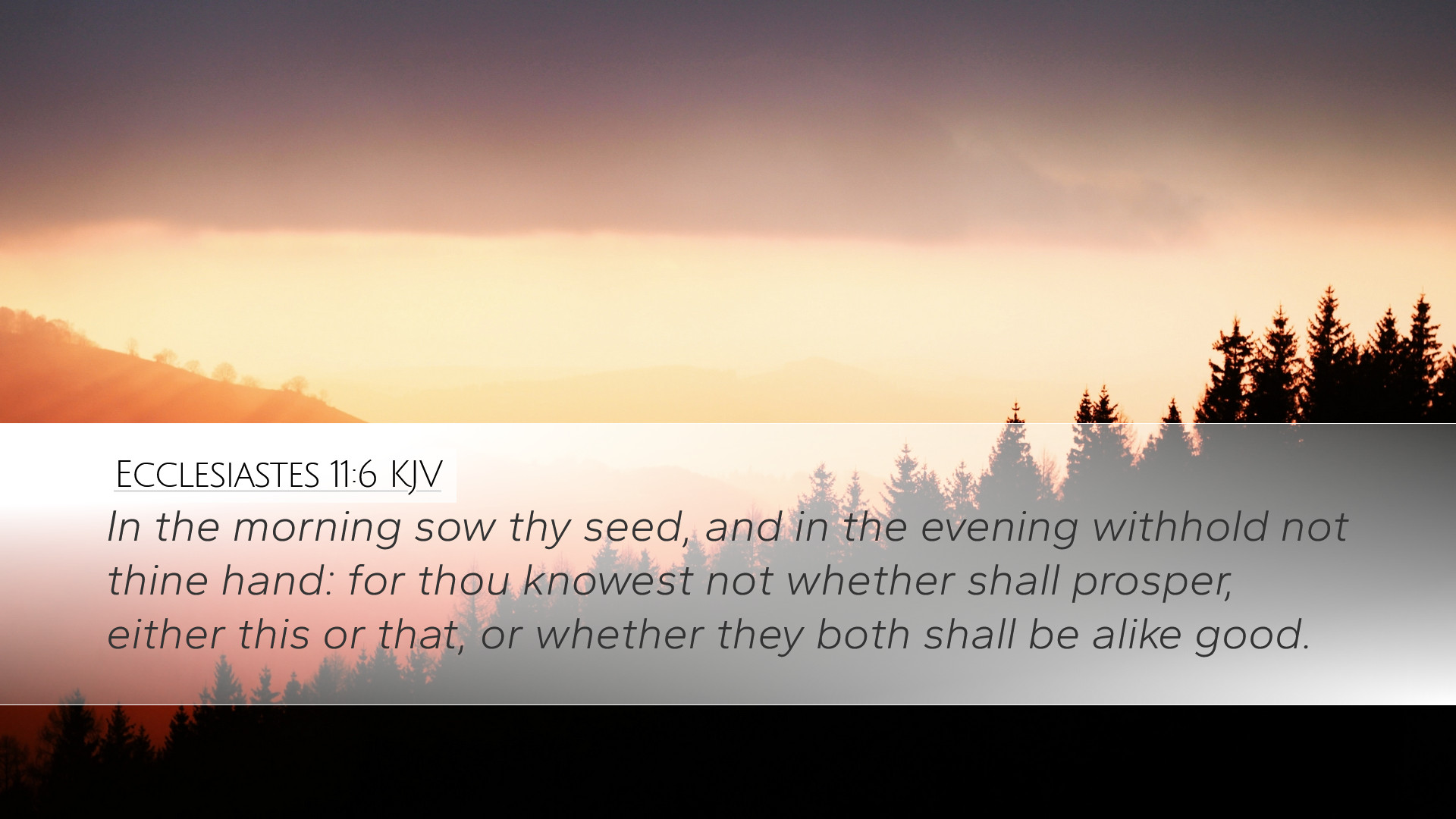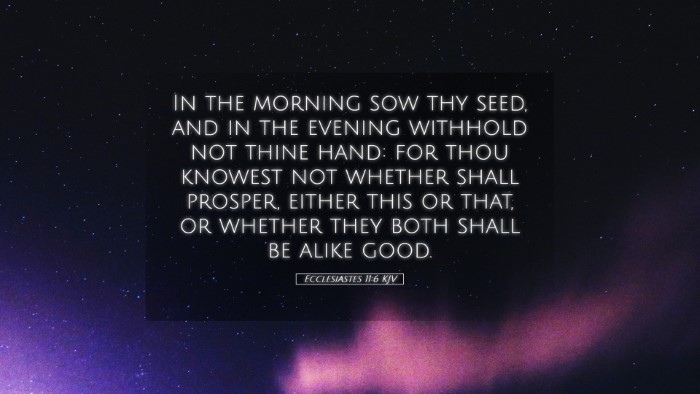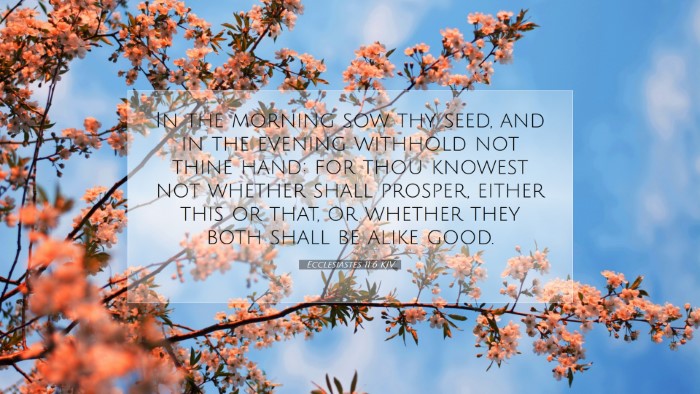Old Testament
Genesis Exodus Leviticus Numbers Deuteronomy Joshua Judges Ruth 1 Samuel 2 Samuel 1 Kings 2 Kings 1 Chronicles 2 Chronicles Ezra Nehemiah Esther Job Psalms Proverbs Ecclesiastes Song of Solomon Isaiah Jeremiah Lamentations Ezekiel Daniel Hosea Joel Amos Obadiah Jonah Micah Nahum Habakkuk Zephaniah Haggai Zechariah MalachiEcclesiastes 11:6
Ecclesiastes 11:6 KJV
In the morning sow thy seed, and in the evening withhold not thine hand: for thou knowest not whether shall prosper, either this or that, or whether they both shall be alike good.
Ecclesiastes 11:6 Bible Commentary
Commentary on Ecclesiastes 11:6
Verse Text: "In the morning sow thy seed, and in the evening withhold not thine hand: for thou knowest not whether shall prosper, either this or that, or whether they both shall be alike good."
Introduction
The verse under consideration, Ecclesiastes 11:6, is steeped in wisdom and practicality, offering profound insight on the themes of labor and uncertainty in life. This verse serves as a guiding principle for one's actions, reinforcing the necessity of diligence and the recognition of life's unpredictability. It encourages a balanced approach to work and highlights the importance of perseverance.
Summary of Insights from Commentaries
1. The Context of Ecclesiastes
Ecclesiastes, traditionally attributed to King Solomon, presents an exploration of the meaning of life and the futility of human endeavor absent of divine purpose. This book is characterized by its philosophical tone, reflecting on the transient nature of life and the pursuit of fulfillment. In this context, Ecclesiastes 11:6 serves as practical advice amidst existential reflections.
2. Matthew Henry's Commentary
Matthew Henry emphasizes the practical aspect of work in this verse. He illustrates that sowing seed in the morning signifies diligence in starting tasks early and being proactive. The evening reference suggests that believers should not shy away from labor even when the day appears to be ending. Henry asserts that human labor is crucial, yet the outcome remains in God's hands, urging humility as one recognizes the limits of human understanding regarding success.
3. Albert Barnes' Commentary
Albert Barnes, in his exposition, reiterates the uncertainty of life's outcomes and the necessity of continual effort. He elucidates the metaphor of sowing seed, which encapsulates the idea of initiating endeavors without certainty of success. Barnes encourages readers to remain diligent and steadfast in their works, reinforcing the notion that both the morning and evening activities are essential, utilizing each moment to its fullest potential.
4. Adam Clarke's Commentary
Adam Clarke expands on the concept of sowing and reaping as a natural law akin to spiritual principles. He points out that the act of sowing in the morning and evening symbolizes a comprehensive approach to life—one that embraces opportunities regardless of the time or circumstances. Clarke advocates for an unwavering commitment to one's tasks, emphasizing that we should perform our duties in faith, without preconceived notions about the eventual results.
Thematic Analysis
1. The Importance of Diligence
Each commentary underscores the value of diligence. The command to sow in both the morning and evening highlights a call to work continually and not to become passive or complacent. This emphasis on diligence reflects biblical principles found throughout scripture, encouraging believers to labor actively in various aspects of life, be it spiritual, intellectual, or physical.
2. Embracing Uncertainty
There is a recurring theme regarding the uncertainty of outcomes. The verse encapsulates the human experience, wherein individuals cannot predict which endeavors will yield fruit. This uncertainty should not deter us from working hard; rather, it invites an attitude of trust in God's sovereign will and timing. Each commentary advocates for a balanced perspective on faith and works, illustrating a necessary tension between action and reliance on divine providence.
3. The Dual Nature of Effort
Commentators reflect on the duality of effort—how both the acts of morning and evening sowing bear significance. The idea is not merely about starting strong but also about sustaining effort in times of difficulty or weariness. This notion resonates deeply with ministers, as it highlights the importance of not just initial zeal but consistent, enduring commitment to the work God has called one to undertake.
Conclusion
Ecclesiastes 11:6 offers timeless wisdom, expressing the necessity for believers to engage diligently in their endeavors while acknowledging the unpredictability of their fruits. Drawing from the insights of Matthew Henry, Albert Barnes, and Adam Clarke, we find a rich tapestry of understanding that underlines the need for a balanced approach to work, faith, and the acknowledgment of God’s providence. For pastors, students, theologians, and scholars, this verse serves as a reminder to act faithfully and to trust in the outcomes, which ultimately belong to God.


